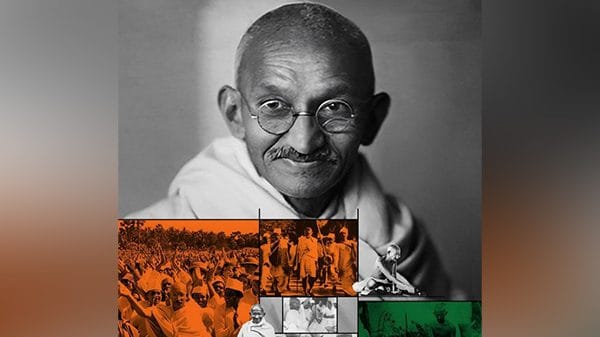Thank you dear subscribers, we are overwhelmed with your response.
The timelessness of Mahatma Gandhi was once again revived with the recently concluded G20 summit of international leaders in New Delhi. However, it was not only Delhi-based Rajghat that was decked up as one of the avenues for welcoming world leaders but many regional centers for the summit, Varanasi being one of them, installed Gandhi’s recycled art installation for welcoming the delegates. Gandhi seemed to be an all-pervasive and indispensable extension of India’s identity for the West with cutouts of the Mahatma, graffiti art on him at major city venues, and distribution of khadi scarves as return gift for guests.
The Western fascination with Gandhi dates even prior to Winston Churchill’s oft-quoted address of him as a “half-naked fakir of a type well known in the East.” The charismatic appeal of Gandhi began to show its influence during his South African days when the Mahatma is said to be in the making. General Smuts, the supreme commanding agent of the British administration in South Africa, had already rendered Gandhi a ‘saint’ at the time of his return to India in 1915, “the saint has left our shores- I sincerely hope forever.” Though Smuts displays a sense of satisfaction and relief for Gandhi’s departure due to the difficult time that Gandhi gave him in the South African colony by launching numerous Satyagraha’s yet he does not speak of him as a bitter enemy but designates him as a saint. Gandhi’s saintliness continues in reforming the heart of Lord Irwin, the most stern and uncompromising British governor-general, towards the culmination of his tenure in India. Salman Rushdie, then becomes quite justified in his claim to highlight that Gandhi fits in the Western exotic impulse of viewing India as the “fountainhead of spiritual-mystical wisdom” where he assumes the role of the holy man like those of the Buddha.
Why is there this deep desire to sanctify Gandhi? Why does the West seem desperate to designate Gandhi as saint and extract him out of his humanity? What was so exclusive and peculiar about Gandhi that rendered him a global saintly icon? There seems to be much more at play than viewing him as a messenger of Truth and non-violence. As Vinal Lal puts it, Gandhi seemed more gentlemanly than his so-called gentlemen counterparts from the West seen in the during the term of Stalin’s Russia, Hitler’s Germany, and exploitative British colonial administration. Gandhi actually tried to live a humane life with the utmost honesty as possible. Even if he was unethical during certain episodes of his life his honest acceptance of the same in public life with complete transparency makes him an ideal human being. Humanity demands a life governed by ethics, morality, and conscientious righteousness which Gandhi encompasses in complete spirit. The irony of Gandhi’s humanity lies in the fact that these values have become so rare or obsolete in the Western world marked by blind progress, incessant competition, and rapid technological advancement in the name of modernization that Gandhi has been rendered a saint. Thus, there lies a justifiable need to revoke him consistently as a sign to remind, “Generations to come will scarce believe that such a one as this walked the earth in flesh and blood” (Albert Einstein)
These pieces are being published as they have been received – they have not been edited/fact-checked by ThePrint.


